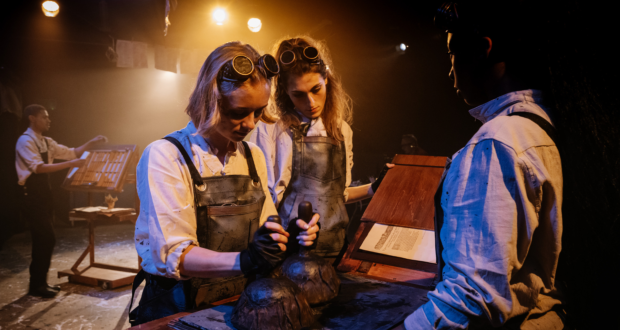A timely reflection on Shakespeare’s ongoing relevance, and on human empowerment through engaging with storytelling and language.Summary
Rating
Excellent
A while ago I touched a copy of Shakespeare’s First Folio. It resonates with history and global importance and I was awed that a mere mortal like me could be allowed so close to such an exalted, illustrious document. Then the owner of the copy pointed out the unique human histories contained within the physical marks on its pages: scribbles in the margins, incorrectly placed frames – and an inky fingerprint. Suddenly this was no longer just Shakespeare’s property, but that of everyone who has ever engaged with it. Compositor E, performed 400 years after the Folio was printed, is a timely commentary on the Bard’s ongoing relevance, our human relationships with storytelling and language, and the empowerment access to such great works can offer.
It’s 1623, some years after the great playwright’s death, and typesetting of the First Folio has begun. Brusque printer Isaac Jaggard (Kaffe Keating) has employed an inexperienced young apprentice, John Leason (Tré Medley), to do this job, his usual typesetter Richard Bardolph (a delightfully comedic David Monteith) having fallen ill. Amidst the hurly burly of a busy workshop, John sets the type. He takes ownership of Shakespeare’s words as he chooses how they fit the page or interprets a word that’s unclear.
It’s a joy to see Shakespeare’s treasured text as it comes alive before us, building character by character and projecting boldly across the set, and the audience excitedly reads and predicts what comes next. A printer’s workshop setting is energetically activated by Rachel Sampley’s creative video, Sophia Pardon’s inky set design and Adam McCready’s vibrant soundscape.
As John, Medley intelligently delivers a role that evolves at speed. This is an everyman who soon recognises the power in his choices. Shakespeare may be dead, but now a new writer is born in him. As stories form and responsibility for the printing house changes hands, a sense of constant transition is palpable.
There’s a thread of Macbeth throughout, themes of powerplay and disrupted status. Three female assistants are the witches, stirring the bubbling ink, which suggests magical properties in the texts being printed. They add an interesting choreography that softens the sometimes argumentative dialogue of men battling to leave their mark. It’s a shame, however, that all the women in the play are largely voiceless, being talked about rather than having their own input.
Some elements feel not fully explained, but that’s in some ways a positive, requiring the audience to actively work to achieve understanding. Jaggard, played confidently by Keating, uses the mystical language of typesetting and publication, which is initially unfamiliar, but we learn to comprehend it as he speaks, and we connect. John’s flashback memories are fragmentary and suggestive, but we piece together that his mother was lost after being given the name of ‘witch’ – then recognise how one word has the power to ruin lives.
As in Macbeth, there is a sense of a normality disrupted. John’s actions undermine the power of wealthy purchasers of the Folio, who exclude through their ownership of words, raising salient points about society’s relationships with language and art, and gatekeeping.
400 years after the printing of Shakespeare’s First Folio and we’re still talking about it; still finding endlessly inventive ways to enact it; finding meaning in his incredible, insightful storytelling and poetry. Shakespeare’s work is now not just for the rich who can afford a calfskin-bound copy. It is for all of us, passed onward originally by a lowly typesetter. Compositor E offers an insightful reflection on the empowerment these plays can offer us all, and a satisfying call to arms, framed in Jaggard’s repeated instruction to take them in with the eyes but then act on them with the hands.
Written by: Charlie Dupré
Directed by: Marie McCarthy
Associate Director: Chris Yarnell
Design by: Sophia Pardon
Video and Lighting Design by: Rachel Sampley
Sound Design by: Adam McCready
Compositor E plays at Omnibus Theatre until 7 October. Further information and bookings can be found here.
 Everything Theatre Reviews, interviews and news for theatre lovers, London and beyond
Everything Theatre Reviews, interviews and news for theatre lovers, London and beyond



